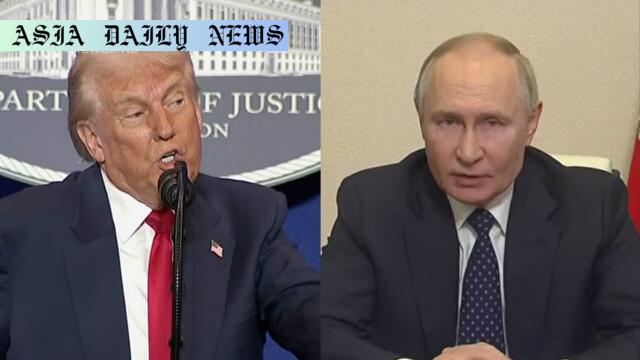Ceasefire discussions intensify as Trump and Putin plan pivotal talks this week, aiming towards Ukraine crisis resolution.
- Key Point 1: Trump and Putin to hold talks this week on Ukraine ceasefire.
- Key Point 2: U.S. envoy Witkoff shared updates after a 3-4 hour Moscow meeting with Putin.
- Key Point 3: Ukraine withdrew forces from Sudzha amidst ongoing territorial dynamics.

Trump and Putin to Engage in High-Stakes Ceasefire Discussions
The world’s attention is drawn to the United States and Russia as President Donald Trump prepares for a vital dialogue with Russian President Vladimir Putin. According to Steve Witkoff, US Middle East envoy, the meeting is expected to mark an important milestone in efforts to resolve the ongoing conflict in Ukraine. Witkoff, who recently held a lengthy three-to-four-hour discussion with Putin in Moscow, described their conversation as ‘positive’ but acknowledged there is much left to address.
The meeting underscores the critical importance of diplomatic maneuvers aimed at securing peace in Ukraine, an area that has witnessed considerable hardship and instability. During his interview with CNN, Witkoff expressed optimism about the forthcoming dialogue between the two leaders. Describing the proposed conversation as a ‘really good and positive discussion,’ he emphasized the need for collaborative solutions that could pave the way for a sustainable ceasefire.
Ukraine’s Strategic Shifts in Sudzha Amid Negotiation Efforts
While diplomatic talks intensify, the situation remains dynamic on the ground in Ukraine. On Sunday, the Ukrainian military released updated battlefield maps revealing a significant shift: the total withdrawal of Ukrainian forces from the city of Sudzha in the Kursk region. Initially captured during Ukraine’s cross-border efforts, the city was recently claimed by Moscow to be under its control. Ukraine’s strategy of leveraging captured territory to gain an upper hand in negotiations has encountered challenges, with the retreat from Sudzha now being scrutinized as a possible setback.
The decision to withdraw, coupled with Russia’s assertion of recapturing the city, has added new complexities to the conflict. Analysts point out that while short-term territorial losses may appear significant, the focus on diplomatic channels offers a broader pathway towards a lasting resolution. Both countries remain at crossroads, with the international community closely observing these developments.
Diplomatic Channels: The Broader Context
As discussions between global leaders loom on the horizon, it’s evident that the road to peace in Ukraine is filled with challenges and opportunities. Conflict resolution in a politically sensitive region demands well-calibrated and strategic dialogues involving multiple stakeholders. Trump and Putin’s talks represent not only a crucial step in addressing immediate issues but also in setting long-term frameworks for cooperation and stability.
Both nations have vested interests, and the political climate surrounding these talks has sparked mixed reactions among analysts and governments alike. While some are optimistic about the prospect of progress, others remain wary of the underlying complexities. Witkoff’s observations about a ‘positive’ atmosphere suggest readiness on both sides to engage constructively, though tangible outcomes remain to be seen. As the week unfolds, all eyes will be on the conversations initiated at the highest level, with hopes pinned on diplomacy’s potential to bridge divides.



Commentary
The Importance of Diplomacy in Global Conflict Resolution
The Trump-Putin discussion comes at a time when international attention on the Ukraine crisis is at its peak. Diplomatic dialogues like these play a pivotal role in shaping the strategies and decisions that determine the future of nations. Witkoff’s insights from his meeting with Putin give us hope that leaders, despite their differences, are willing to engage in meaningful conversations when the stakes are at their highest.
It is crucial to recognize the significance of each party coming to the table with an open mind. At a time when mistrust often overshadows diplomacy, this effort signals a potential turning point. Resolving a conflict as complex as Ukraine’s requires not just bold decisions but also the tenacity to stick through negotiations even when progress seems improbable. Achieving peace may demand compromises and shifts in position, but such sacrifices are often necessary for the greater good.
The Role of Strategy in Ukraine’s Position
On the ground, Ukraine’s strategic maneuvers, including the decision to withdraw from Sudzha, reveal a layered and calculated approach to negotiation. While it may appear as a setback, these developments should not be viewed in isolation but rather as tactical moves in a larger game. Territorial concessions, if part of a broader peace negotiation, could pave the way for a durable solution, even if they come with short-term losses.
The character of modern conflict is ever-evolving, and leaders must adapt to ensure their actions align with long-term goals. Diplomacy, fueled by robust preparation and analysis, serves as the only viable mechanism to achieve these objectives without inflicting further harm on affected populations. The careful navigation of such discussions must be lauded and supported.
What Lies Ahead for Ukraine and Russia
The anticipated Trump-Putin dialogue offers a glimmer of hope for a region weary of prolonged conflict. While it is vital to temper expectations, the mere fact that such high-level discussions are on the horizon is a step in the right direction. The world will be watching as these leaders take the stage in what could be a defining moment for Ukraine, Russia, and the international community.
As we move forward, it is imperative to extend support for diplomatic efforts and to advocate for outcomes prioritizing peace, stability, and the well-being of all involved. History has shown us that even the most entrenched conflicts can find resolution through dialogue, and the Ukraine crisis should be no exception.